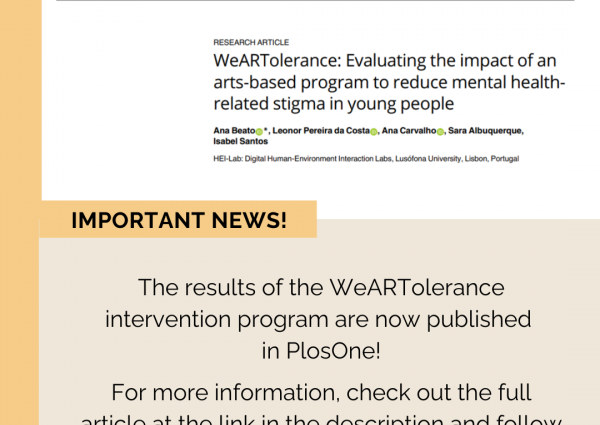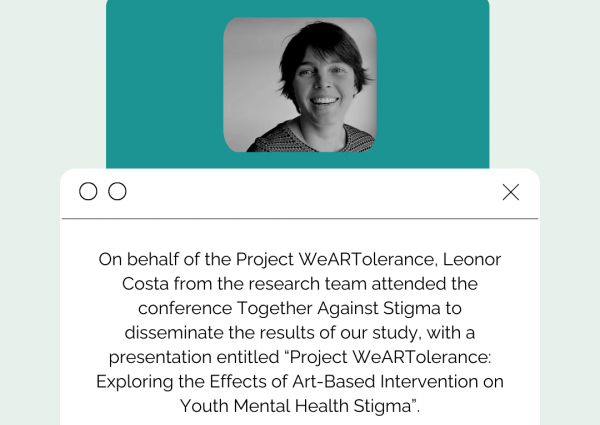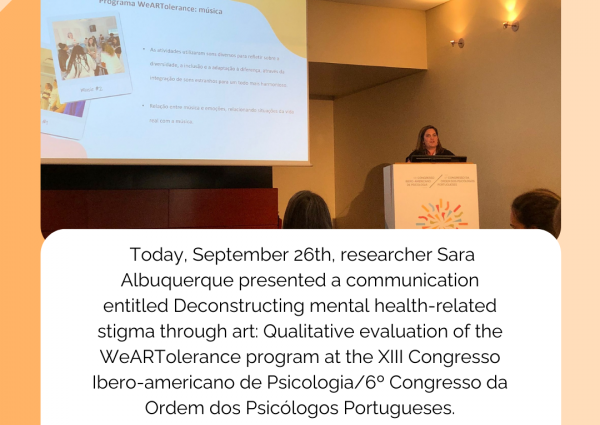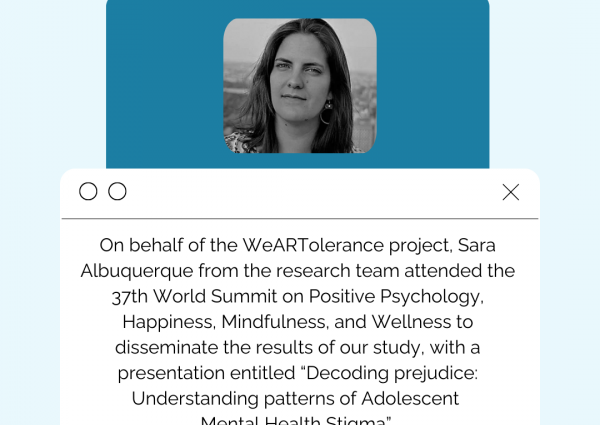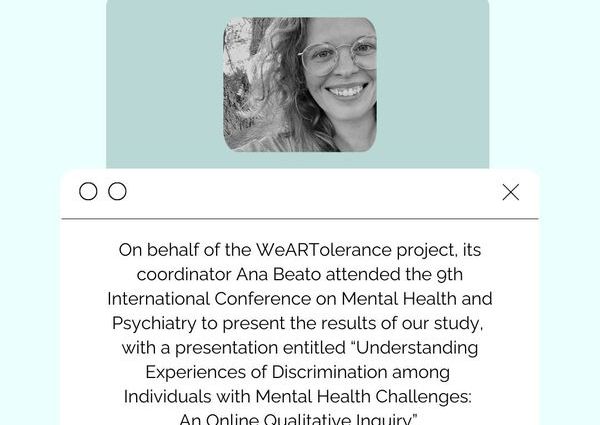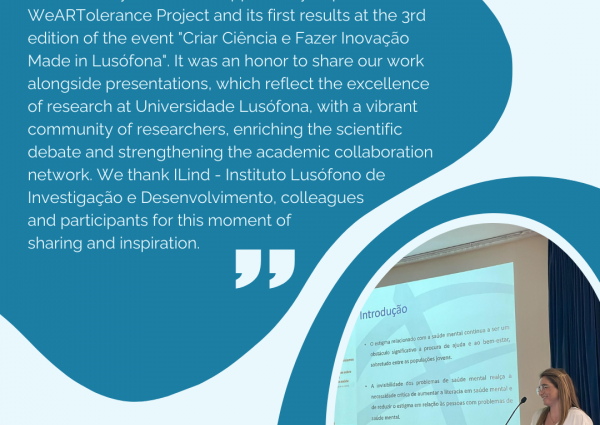Our studies
Study 1 - Evaluation of the intervention program
The intervention program consisted of 12 sessions (psychoeducation, visual arts, cinema, music, and theater) carried out over four consecutive days, as shown in the example below:
The program evaluation was conducted through a mixed-methods study divided into two phases:
(1) Quantitative evaluation of the program's impact on mental health literacy (knowledge about mental health problems and associated stigma), intergroup anxiety (emotions toward people with mental health problems), social distance (desire to maintain distance from people with mental health problems), and social stigma (attitudes toward people with mental health problems);
(2) Qualitative evaluation of participants' perspectives and satisfaction.
After recruitment, participants were randomly divided into eight groups (i.e., four intervention groups and four control groups). The intervention groups took part in the 12 sessions of the program.
Questionnaires were administered to all participants, both in the control and intervention groups, at three moments: one week before the program (pre-intervention), one week after the program (post-intervention), and six months after the program (follow-up). Some participants from the intervention groups took part in focus groups to provide qualitative feedback on the program.
In the first phase of the evaluation, 125 young people participated, while in the second phase, nine young people participated, most of whom were female with an average age of 13 years old.
The results from the first phase showed:
- Increased knowledge about mental health after the intervention;
- Decreased social distance, intergroup anxiety, and social stigma after the intervention.
The results from the second phase revealed general satisfaction with the program, highlighting increases in:
- Knowledge about mental health;
- Personal and social skills (e.g., communication and emotional identification);
- Awareness of the role of social cohesion, solidarity, and community support in combating stigma.
Interventions similar to the WeARTolerance project, which combine psychoeducation with creative activities, can contribute to improving attitudes toward mental health and reducing stigma among young people, which will have a positive impact on future generations.
Article published in Plos One. You can check it here.
Study 2 - Population attitudes towards mental health
Study 2 aims to:
- Explore knowledge, attitudes and perceptions about mental health problems and the associated stigma in children, adolescents and adults from 9 years old;
- Characterize attitudes related to discrimination and concealment in adults with mental health problems;
- Describe agreement and awareness about stigma in children and adolescents.
The instruments applied aim to evaluate:
- Sociodemographic data: age, sex, education, current or past mental health problems, among others;
- Personal concealment: frequency of disclosing mental health problems to others and frequency of people knowing they had a mental health problem;
- Personal and group discrimination: personal experiences of discrimination and perceptions of attitudes and behaviours towards people with mental health problems;
- Stigma: agreement with beliefs about stereotypes, prejudice and discriminatory behaviours and perception of stigmatizing attitudes by most members of society;
- Perceptions regarding mental health and associated stigma.
Currently, scientific work is being carried out to analyze data and disseminate results obtained from the study in several target groups of the Portuguese population.
Study 3 – Evaluation of the impact of the artistic residencies
The artistic residencies consisted of eight artistic workshops (theater, dance, music and literature) and psychoeducational over four consecutive days, with support from Câmara Municipal de Óbidos and participation of young people between 12 and 24 years old.
A study is currently being developed to evaluate the impact of artistic residencies, collecting the following data:
- Sociodemographic and clinical: age, sex, education, mental health problems, among others;
- Well-being: physical well-being, psychological well-being, autonomy and relationships with parents, school environment, social support and relationships with colleagues;
- Adjustment: emotional and behavioral skills and difficulties of children and adolescents;
- Self-esteem: positive orientation and negative orientation;
- Quality of life: physical (pain, discomfort, energy, fatigue and sleep), psychological (positive and negative feelings, self-esteem, spirituality and cognition), social relationships (personal relationships, social support and social activities) and environment (safety);
- Psychological flexibility: psychological flexibility according to the ACT model;
- Emotional regulation: use of two emotional regulation strategies (cognitive reappraisal and expressive suppression);
- Compassion: engagement and compassionate actions in adolescents;
- Negative emotional symptoms: depression, anxiety and stress.
The questionnaires are intended to be administered at 3 moments: one week before the residencies (pre-intervention), one week after the residencies (post-intervention) and six months after the residencies (follow-up). Additionally, questionnaires were administered to assess participants' satisfaction with the activities carried out in the residences.
We hope that participation in the artistic residencies has contributed to promoting mental health awareness, developing skills (e.g., creativity, self-esteem, self-confidence and social relationships) and increasing the well-being of young people.
Study 4 – Evaluation of the impact of a psychoeducational video
The psychoeducational video addresses topics related to mental health problems, myths about mental health and associated stigma, targeting people aged 18 and over.
A study is currently being developed to evaluate the impact of viewing the video, by collecting the following data:
- Sociodemographic and clinical: age, sex, education, mental health problems, among others;
- Mental health literacy: risk factors and causes of mental health problems, strategies for mental health and well-being, knowledge of available professional help, and access to mental health information;
- Impact of the video: knowledge about mental health, development of skills and demystification of myths about mental health;
- Perception about the video: emotions experienced, recommendation and retained messages.
We hope that the video will contribute to promoting mental health literacy, developing skills (e.g. empathy and compassion), and decreasing stigma surrounding mental health.
News
Participation in the Conference Together Against Stigma
The Project WeARTolerance was present at the conference Together Against Stigma!
Participation in the XIII Congresso Ibero-americano de Psicologia/6º Congresso da Ordem dos Psicólogos Portugueses
The WeARTolerance project was present at the XIII Congresso Ibero-americano de Psicologia/6º Congresso da Ordem dos Psicólogos Portugueses!
Participation in the 37th World Summit on Positive Psychology, Happiness, Mindfulness, and Wellness
On behalf of the WeARTolerance project, Sara Albuquerque from the research team attended the 37th World Summit on Positive Psychology, Happiness, Mindfulness, and Wellness to disseminate the results of our study, with a presentation entitled “Decoding prejudice: Understanding patterns of Adolescent Mental Health Stigma”.
Participantion in the 9th International Conference on Mental Health and Psychiatry
On behalf of the WeARTolerance project, its coordinator Ana Beato attended the 9th International Conference on Mental Health and Psychiatry to present the results of our study, with a presentation entitled “Understanding Experiences of Discrimination among Individuals with Mental Health Challenges: An Online Qualitative Inquiry”.
Participation in the 3rd edition of the event "Criar Ciência e Fazer Inovação Made in Lusófona"
Last Tuesday we had the opportunity to present the WeARTolerance Project and its first results at the 3rd edition of the event "Criar Ciência e Fazer Inovação Made in Lusófona".
It was an honor to share our work alongside presentations, which reflect the excellence of research at Universidade Lusófona, with a vibrant community of researchers, enriching the scientific debate and strengthening the academic collaboration network.
We thank ILind - Instituto Lusófono de Investigação e Desenvolvimento, colleagues and participants for this moment of sharing and inspiration.



